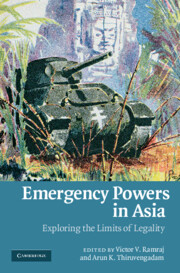Book contents
- Frontmatter
- Contents
- List of contributors
- Preface
- 1 Introduction: emergency powers and constitutionalism in Asia
- PART I Perspectives from legal and political theory
- 2 The emergency powers paradox
- 3 Emergency powers, constitutionalism and legal transplants: the East Asian experience
- 4 Constitution and ‘extraconstitution’: colonial emergency regimes in postcolonial India and Pakistan
- 5 The princely impostor: stories of law and pathology in the exercise of emergency powers
- PART II Postcolonial and post-conflict transitions
- PART III Emergencies, executive power and constitutional order
- PART IV The role of the courts
- Index
- References
4 - Constitution and ‘extraconstitution’: colonial emergency regimes in postcolonial India and Pakistan
from PART I - Perspectives from legal and political theory
Published online by Cambridge University Press: 04 August 2010
- Frontmatter
- Contents
- List of contributors
- Preface
- 1 Introduction: emergency powers and constitutionalism in Asia
- PART I Perspectives from legal and political theory
- 2 The emergency powers paradox
- 3 Emergency powers, constitutionalism and legal transplants: the East Asian experience
- 4 Constitution and ‘extraconstitution’: colonial emergency regimes in postcolonial India and Pakistan
- 5 The princely impostor: stories of law and pathology in the exercise of emergency powers
- PART II Postcolonial and post-conflict transitions
- PART III Emergencies, executive power and constitutional order
- PART IV The role of the courts
- Index
- References
Summary
Introduction
On 3 November 2007, Pakistan's President and Chief of Army Staff, General Pervez Musharraf, issued a ‘proclamation of emergency’, nominally predicated upon the rise of extremism and terrorist violence which, he asserted, ‘pos[ed] a grave threat to the life and property’ of Pakistan's citizens. In a televised address, Musharraf went further, defending the emergency as necessary to ‘save Pakistan’ and to prevent nothing less than the country's ‘suicide’. Despite these existential overtones, the emergency was widely criticised as a pretextual attempt for Musharraf to maintain power, not a means to combat terrorism. In the weeks that followed, Musharraf assumed sweeping executive powers and cracked down heavily on regime opponents.
Notably, Musharraf's opponents resisted not only the crackdown itself, but also his characterisation of those measures as involving ‘emergency’ at all. Like other constitutions, Pakistan's explicitly authorises the executive to invoke emergency powers to address crises posing a severe threat to the nation. However, Musharraf's decree was self-consciously extraconstitutional, aimed at objectives not typically associated with the constitutional idea of ‘emergency’. Following a script established during earlier moments in Pakistan's history, Musharraf sought to preserve the political status quo, but by transforming Pakistan's institutional and legal order, purging independent judges from their posts and promulgating constitutional amendments and other laws by decree, rather than through normal lawmaking processes.
- Type
- Chapter
- Information
- Emergency Powers in AsiaExploring the Limits of Legality, pp. 89 - 120Publisher: Cambridge University PressPrint publication year: 2009
References
- 3
- Cited by



